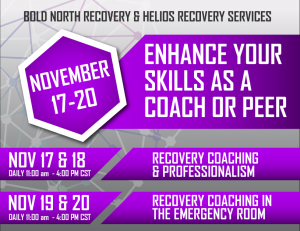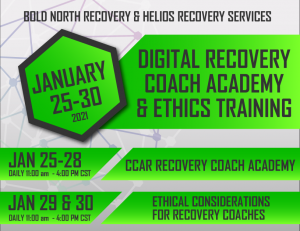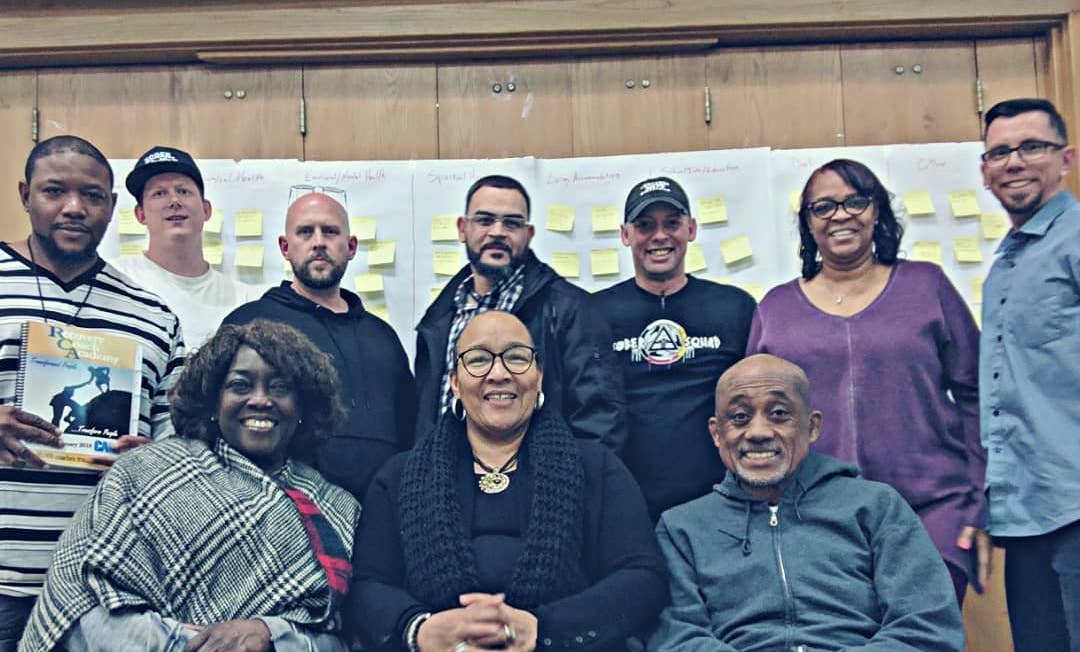Welcome to part three of the four-part Introduction to Recovery Coaching. In this segment, we’ll pick up by exploring Cultural Humility as a Recovery Coach.
Last week, I trained the CCAR Recovery Coach Academy for a group of 18 people in Wisconsin. During this course, we look at the importance of culture, privilege and power dynamics, and how they relate to the recovery field. During this part of the training, there is always a palatable mixture of reactions. Reactions range from awakened understanding and deepened awareness, to resistance to idea that these realities could even be concepts or words used in recovery space. As a facilitator, it is truly a challenge to navigate all of this, while simultaneously making sure we move onto the next module and end the day on time.
Cultural Humility
The term cultural humility is relatively new in the coaching and recovery space, at least for me. I learned this term when attending a training with the YMSM & LGBT Center of Excellence in 2015. During the training, we looked at how many “cultural competency,” “cultural humility,” or “cultural sensitivity” trainings are designed to sensitize providers to the special needs and vulnerabilities of different populations. These trainings establish the idea that “diversity” and “culture” are just other ways of saying “not the norm.” This mentality perpetuates negative biases and stereotypes, and withholds resources. Along with these consequences, some people also subscribe to the idea that one can become fully culturally competent. They believe that they do not need to look further into their implicit biases or prejudice.
Cultural Humility is the lifelong process of learning, self-examination & refinement of one’s own awareness, knowledge, behavior and attitudes on the interplay of power, privilege and social contexts.
Cultural humility invites us to:
- Engage in self-reflection and self-critique
- Bring into check power imbalances
- Assess anew the cultural dimensions of the experience of each person
- Relinquish the role of expert of someone else’s experience
- See a person’s potential to be a capable and full partner in their recovery
- Challenge ourselves in identifying our own values as not the “norm”
- Remain open to learning
- Become comfortable with the idea that there are things I don’t know that I don’t know
But why include this?
The answer is simple. We (the recovery, treatment, prevention, and harm reduction fields) need to respond to the systemic oppression and violence perpetrated on BIPOC (Black, Indigenous & Persons of Color) and LGBTQQIA+ (Lesbian, Gay Bisexual, Transgender, Queer, Questioning, Intersex and Asexual) individuals. There is no escaping it—the world, our country, our neighborhood, our meetings, and our systems are all interconnected and interdependent. It is what makes recovery constantly evolve and adapt.
Recovery Coaches have the unique opportunity not only to become resource navigators, walking with individuals and families to connect them with the community, but they also get to learn about why those systems don’t benefit everyone equally. With the War on Drugs having influenced modern public policy by deeply rooting the idea of a punitive system to correct a medical condition, finding access or equitable help is significantly more difficult for BIPOC/LGBTQQIA+ individuals.
Is recovery really ‘universal’?
Dr. Eddie Moore Jr. and Ryan Hampton explain this concept in the article, Recovery Equity is Better Than “One Size Fits All” Sobriety. They state, “While we often like to say that recovery is ‘universal,’ that really isn’t true because of structural and institutional inequities that are hard-baked into our systems. Although we like to say that ‘addiction is the great equalizer’ and ‘we all have the same 24 hours,’ that’s not accurate, either.” They further point out that, “Oppressive power structures are everywhere in recovery, even in spaces that are nominally for everybody.”
As I mentioned in the first article of this series, I worked for Goodwill Industries of North Central Wisconsin at a program called Harmony Café. Our very first location found itself neighbors to the Multi-Cultural Center and American Indian Center. The Café itself became a hub of diverse programming. It was a space for people who felt like they didn’t fit in at other cafes or places in the downtown area—it was a refuge of sorts. It felt like the meetings I attended where anyone was welcome, and there was always coffee available.
A Pathway of Privilege
The Café was also where I first learned about my own privilege as a white, cisgender, male. Despite my felonies, traumas and being a person in recovery, I was afforded a lot opportunity not all others experience. My first treatment in 2001 lasted five months, and was completely paid for by the State of Wisconsin, as an alternative to going to prison. After that, I went to a second treatment facility for a month that was paid for by the county. Then, I moved into a subsidized three/quarter house where I lived for almost 18 months.
I share this both out of the enormous amount of gratitude I have for this experience, and to illustrate how my pathway to recovery was one of opportunity and privilege. We know that millions of Americans are denied access to help, or do not know how to access even if it were available.
Recovery is not only social justice advocacy, it is social reform activism.
Being an Advocate
Another role that participants are invited to look at during training is the Big “A” of Advocate. This is an invitation to start advocating for the needs of the Recovery Community by being a voice and face in the public when opportunities arise. This can look like speaking at a Rally for Recovery month, testifying for recovery, enhancing policy and more. This also opens the door for individuals to truly see how vast and complex the current systems are, and where change needs to be made.
We begin to learn that there is an entire culture of oppression, sexism, racism, homophobia, transphobia, and classism to navigate. Participants in the Recovery Coach Training are also challenged to dedicate themselves to the practice of “managing their own stuff.” This is where the move from social justice turns into social reform. It’s where we look deeper at our own implicit bias. It’s where we must be willing to risk our privilege and comfort to lift others up and expose the flaws in our system and movement. It is through this awareness, interconnectedness and acceptance that we can heal communities, families and people struggling today.
It is the recovery movement’s responsibility to create new advocates who will agitate for systemic change. This work must be grounded in a politic and analysis that fosters lasting change for all individuals impacted by drug use.
– Liberation in Action Workshop; Mariel Hufnagel, MPA, CPRS / Keith Murphy, LPC, LCADC
Some Suggested Resources
As a coach, it is important to be constantly learning and managing my own stuff. Here are some resources that were helpful for me, as well as citations for terms.
The 21 Day Challenge: For 21 days, do one action to further your understanding of power, privilege, supremacy, oppression, and equity. The plan includes suggestions for readings, podcasts, videos, observations, and ways to form and deepen community connections.
The Privilege Institute: The Privilege Institute (TPI) provides challenging, informative, and practical strategies, programs, and resources. TPI empowers people to take action and be accountable on the topics of diversity, power, privilege, and leadership.
How to Make Antiracist Work a Part of Your Recovery Program
Implicit Bias: Attitudes or stereotypes that affect our understanding, actions and decisions in an unconscious manner. These biases, which encompass both favorable and unfavorable assessments, are activated involuntarily and without an individual’s awareness of intentional control.
Intersectionality: The interconnected nature of social categorizations such as race, class, and gender as they apply to a given individual or group, regarded as creating overlapping and interdependent systems of discrimination or disadvantage. (Kimberlé Williams Crenshaw)
 Recovery Coaching & Professionalism / Recovery Coaching in the ER
Recovery Coaching & Professionalism / Recovery Coaching in the ER
November 17-20 / 11:00 am – 4:00 pm
Location: Digital online
Cost: $500
Register: Contact Randy Anderson at boldnortherrecovery.com
More info at: www.heliosrecovery.com
 Recovery Coach Academy Training & Ethical Considerations
Recovery Coach Academy Training & Ethical Considerations
January 25-30 11:00 am – 4:00 pm
Location: Digital online
Cost: $650.00
Register: Contact Randy Anderson at boldnortherrecovery.com
More info at: www.heliosrecovery.com



1 Comment
Very helpful article. It’s given me helpful ideas to pursue my continuing education, and hopefully, enlightenment.
Thank you!